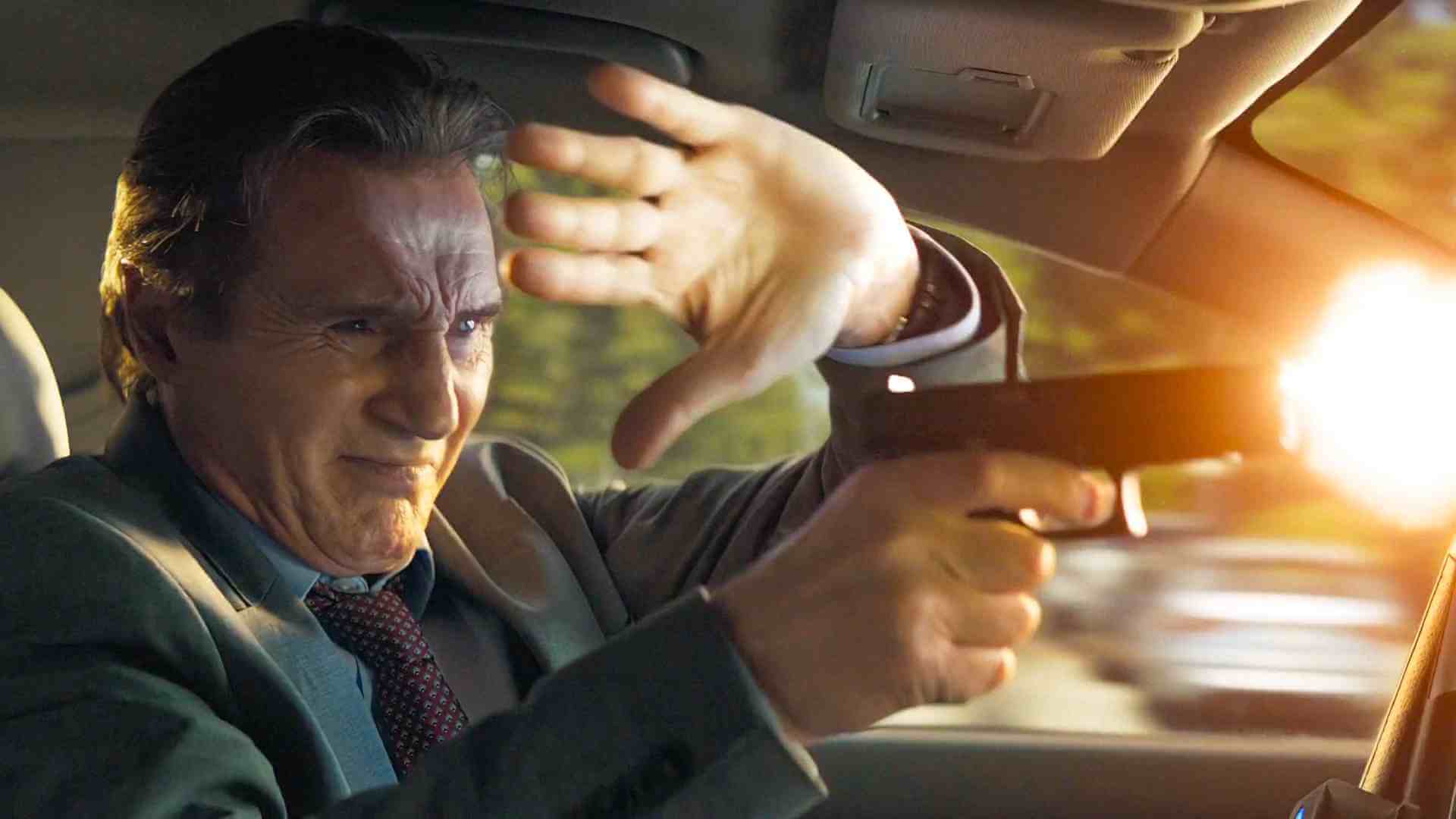Spoofs haven't defined Liam Neeson's career, which makes him perfect for them
The Naked Gun, no longer relying on a stone-faced character actor going goofy, benefits from a star with a well-known persona.
Photo: Paramount Pictures
On March 21, 1994, while Liam Neeson attended the 66th Academy Awards for his first-ever nomination in the Best Actor category, Leslie Nielsen was crashing his own Oscar ceremony, throwing up into a tuba on thousands of screens nationwide as bumbling cop Frank Drebin in Naked Gun 33 1/3: The Final Insult, which had opened three days prior. Nielsen was wrapping up the comedy-trilogy centerpiece of his late-career pivot; Neeson, meanwhile, just had his major breakthrough after a decade-plus as a gigging actor, somewhere above character actor but below leading man. His Oscar nomination for Schindler’s List would represent a career peak (he has yet to score another nod), just as Nielsen would never again know commercial or critical success at the Naked Gun level. Now Neeson is complicating his third act by assuming the role of Frank Drebin Jr. (who technically debuts during the final scene of The Final Insult) in The Naked Gun, a sort-of sequel to the original series that capably recaptures its spirit and seems to be shaping up as a late-summer hit. A good part of why it works creatively—and why it’s worked at the box office, too—is that Neeson is such an inspired choice as a new Drebin. But this successful casting may also alter the trajectory of one the more unusual later-period acting careers in Hollywood.
Drebin certainly altered Nielsen’s. The Canadian actor bounced between TV and film roles for several decades, occasionally happening upon a high-profile lead (1956’s Forbidden Planet) or supporting part (1972’s The Poseidon Adventure). These experiences proved invaluable for his casting in David Zucker, Jim Abrahams, and Jerry Zucker’s Airplane! (1980), a spoof of disaster movies like Airport and, yes, The Poseidon Adventure. As the stone-faced token doctor onboard an imperiled aircraft, Nielsen was the most effectively deadpan in an entire cast tasked with keeping a straight face during a wild travestying of familiar genre tropes. His “I am serious, and stop calling me Shirley” may be his best-remembered moment, for good reason: He’s broadcasting his straight-faced commitment and chasing it with a completely ridiculous joke. Perhaps more emblematic of his skill in this role, however, is the climactic running gag of Dr. Rumack popping into the cockpit to say “I just want to tell you both good luck. We’re all counting on you” to our heroes multiple times, including after the plane has landed. He says this with utter no-fuss character-actor conviction, in pure obliviousness to what’s actually happened around him.
Nielsen continued to take a variety of roles for much of the 1980s, but after Airplane! and the short-lived Police Squad! TV series where he first played Frank Drebin (and for which he received an Emmy nomination), his path to The Naked Gun had been cleared. He’s one of the only actors you’ll see with the notation “final non-comedy role” specified on his Wikipedia filmography. (It’s a supporting part in Nuts, with Barbra Streisand.) In between Naked Gun movies, and for years afterward, Nielsen would lend legitimacy to a variety of Naked Gun knock-offs, ranging from mildly likable (Wrongfully Accused) to mildly woeful (Spy Hard) to just plain dire (Repossessed). He worked with genuine spoof legends like Mel Brooks, ZAZ-world figures like Pat Proft, and utter randos like the elderly father of bad-spoof co-maestro Jason Friedberg. He also did a number of family comedies, presumably to capitalize on the former tweens who would have once delighted in his nominally more grown-up fare. His second-act success ensured that entire generations would have little awareness of anything Nielsen did in the first half-century of his life.
At 73, Neeson is significantly older than Nielsen was when the original Naked Gun came out. (Nielsen was 62 then, and only in his 50s when he made Airplane! and Police Squad!) That’s because Neeson had a whole leading-man career in the wake of Schindler’s List that was higher-profile than Nielsen’s serious work in the 1950s, ’60s, and ’70s ever was. He was a swashbuckling hero in Rob Roy, a sensitive scene partner to Jodie Foster in Nell, and an Irish revolutionary in Michael Collins—all movies that took advantage, as Schindler’s did, of the authority projected by his voice and towering frame, as well as the vulnerability beneath them. These qualities also made him an ideal mentor figure in big-budget blockbusters, convincingly guiding everyone from Obi-Wan Kenobi to Batman to those Pevensie brats. Neeson’s own mid-50s second act pivoted, like Nielsen’s, away from more serious fare. But rather than comedy, he became an avatar of grim action. Following the surprise success of Taken, he hopped between a number of parallel thriller tracks: actual and de facto sequels to Taken; thrillers that leveraged that Taken-style gravitas to tell more anguished and guilt-ridden stories, often directed by Jaume Collet-Serra; and big-budget Hollywood junk that continued enlisting him to bring real-movie cred to the likes of Battleship or a Clash Of The Titans remake. Around 2020, though, his thriller vehicles converged into increasingly interchangeable movies that often had cursory theatrical releases designed to advertise a streaming future. These were Redbox movies for a post-Redbox era.







































